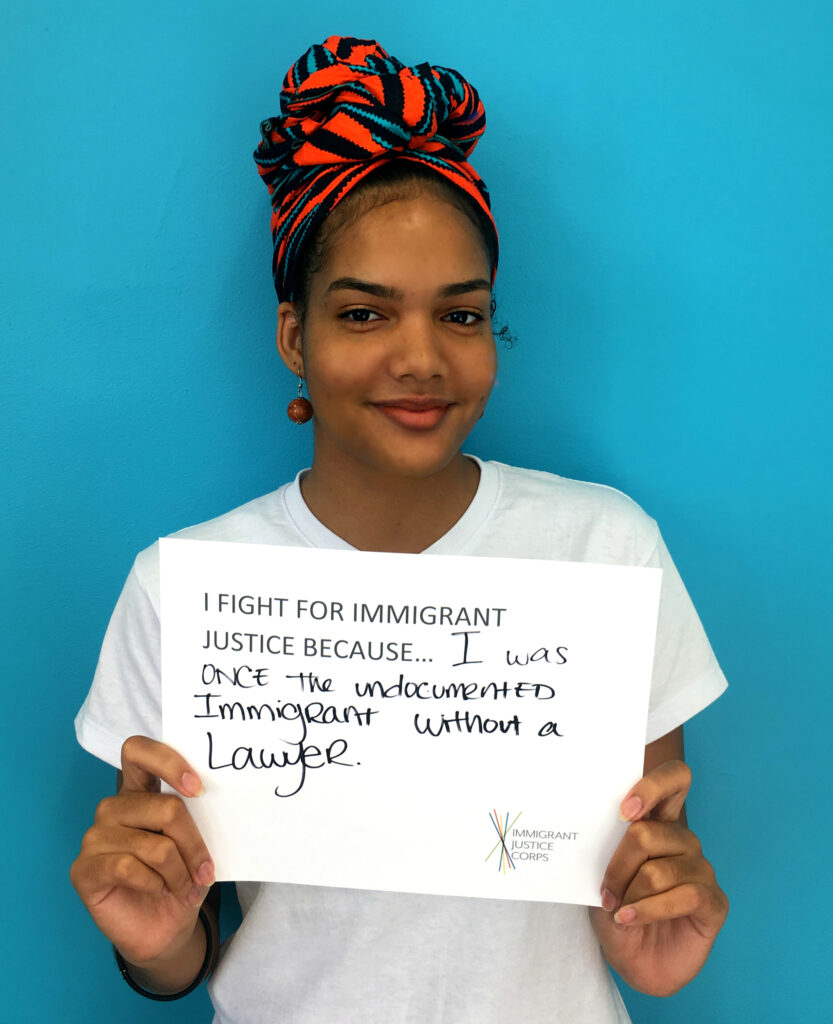Fellow feature: Julia Deng
Before IJC, there was no pipeline for new legal talent into the immigration field. That meant that many immigration lawyers were inadequate. This, coupled with the lack of legal services for immigrants, has led to a crisis in legal representation for immigrants. Quality counsel makes all the difference, and IJC’s Fellows have delivered an over 90% success rate in completed cases, in contrast to a 16% success rate when an immigrant is without counsel.
Below, 2023 Justice Fellow Julia Deng reflects on her experience representing a client who had been previously taken advantage of by an unscrupulous private attorney.
You know them, the people in suits who fold their arms, who meet others’ tragedies with a confident grin and a direct stare. They’re on billboards, in bus shelters, and on the train. For better or for worse, the things they have to say to the public are unforgettable: In pain? Call Wayne! Or, unfortunately, Hood Law. When I was a baby — that is to say, when I was a law student and contrarian who defended tort law at parties — I thought they were tacky but probably harmless. I grew up a little bit when I found out about Mr. G.
Mr. G is folding his arms right now, on his website, where he advertises himself as an immigration lawyer. We had one client in common, whom I’ll call Ms. X. Suffice it to say that she faced horrific violence at home, and for seven years, she saved her pennies and stewed on her plan to leave it all behind. All those years, she knew she was going to seek asylum in the United States. As soon as she got here, she hired Mr. G to help her do it.
Mr. G showed up at her individual hearing with an I-589 so incomplete that it didn’t even count as an application for asylum at all. The judge asked him how that had happened. “I don’t know,” he said. He hadn’t prepared to present her case at all. He appeared to learn about the gang that had threatened her for the very first time in the middle of the hearing, and then he got their name wrong in his closing statement. The IJ ordered her removed. For this experience, Mr. G charged Ms. X over $13,000.
Ms. X searched and searched for a different lawyer to help her with her appeal, but no one else had capacity and she ended up with me. For the month that we spent working on her BIA appeal brief and supporting documents, all I thought about was her legal research, her declarations, her new I-589s, and fifty new ways to say, “Mr. G doesn’t care if his clients live or die.” Because it was required under Matter of Lozada, we complained against him to the bar. To the threat of disbarment, he raised the defense of a man who doesn’t know what competent lawyering looks like (“For asylum purposes, a political opinion must be about the government or governing parties.” “A child with SIJS can petition for their custodial parent.”) Then, because we could, Ms. X and I complained to EOIR too.
During my precious few moments between work and sleep, I lay on my side in the dark and read comments in a Facebook group called Nerdy Immigration Lawyers. “Lozada is for narcs,” said the Nerds. “Snitches get stiches.” Obviously these were not our people. They were his. Racism and classism, laziness and greed — that’s how these profiteers are able to kiss their children good night with the same mouths they use to damn others to poverty, violence, prison, or uncompensated pain. I still believe that some of these billboard people have the sharp minds, the crushing handshake, and the thirst for justice that they claim to have. But there are too few lawyers competent to represent people in immigration matters, which makes it too easy for predators to thrive. Practicing immigration law reminds you every day that evil is real. Let us never forget that it respects no borders.
Want to become a Justice Fellow like Julia? IJC is recruiting for the Class of 2025! Find out more about the Fellowship and the application process below.
